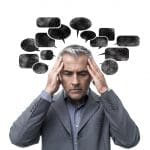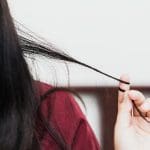What Causes Hair Loss?
Did you know hair loss affects more than 75% of men and nearly two-thirds of women at some point in their lifetime? Unfortunately, medical research has yet to discover a cure for hair thinning; but by understanding the root cause of hair loss and hair thinning, we can better CORRECT hair loss, PREVENT hair loss, and RESTORE the health of your scalp and hair.
Learn more about the various causes of hair loss that may be affecting you or someone you know below. Then schedule an appointment to discover the solution that’s best for you.
Pre- or Post-Menopause
Menopause affects all women at some point in their lives, causing hot flashes, mood swings, and weight gain. Hair thinning and hair loss are unexpected symptoms of menopause, with 40% of women suffering from hair thinning during and after this time.
Stress & Trauma
Everyone experiences stress, but too much of it can lead to hair problems. Stress and trauma, like constriction of blood supply and poor vitamin assimilation, lead the hair follicles to shrink and become dormant, causing hair thinning and hair loss.
Hormones
Hormonal shifts play a significant role in hair thinning and hair loss. Estrogen levels decrease as women enter menopause, making them more susceptible to androgenetic alopecia, or female-pattern hair loss.
DHT
DHT, an acronym for dihydrotestosterone, is a hormonal hair-loss catalyst formed when the enzyme 5 alpha reductase interacts with testosterone. Supplements and other substances like Saw Palmetto can help stop DHT production.
Slow Hereditary Hair Loss
Over 30 million women and 50 million men experience hereditary hair loss. Women experience a gradual, diffuse thinning over the tops of the head, while men experience a receding hairline and balding across the top of the head.
Thyroid Disorder
Hypothyroidism and hyperthyroidism can cause hair thinning and hair loss if severe enough. The disorder causes uniform hair thinning and hair loss across the entire scalp. Regrowth is possible with treatment.
Post-Partum
A woman’s pregnancy “glow” often includes fast-growing, fuller hair with less shedding. However, the stress of childbirth decreased hormone levels post-pregnancy, and even breastfeeding can all lead to hair thinning and hair loss.
Diabetes
Those with diabetes can’t produce enough insulin, resulting in a buildup of sugar that damages blood vessels and prevents oxygen from nourishing hair follicles. This disruption in the hair growth process causes hair thinning and hair loss.
Trichotillomania
Trichotillomania disorder, or “Trich,” causes 1 in every 50 people to compulsively pull out the hair from their scalp, eyelashes, eyebrows, or any other parts of the body, resulting in noticeable bald patches.
Alopecia
Alopecia is an autoimmune disorder in which the immune system mistakenly attacks hair follicles. This results in patches of hair loss across the scalp. Treatments are available to help trigger the growth of new hair.





